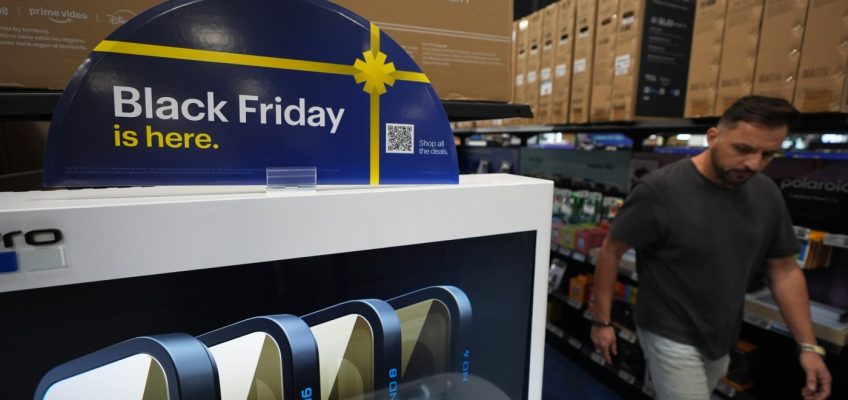U.S. stocks opened with gains on the final trading day of November.
Related Articles
US retailers are about to see if Black Friday benefits from a holiday halo effect
Irresistible deals put them in debt. Now they’re trying to manage their overspending.
The best used hybrid SUVs you can buy for less than $25,000
Roseville: Industrial building planned for Twin Lakes site
Black Friday arrives with solid momentum despite tariffs and economic uncertainty
The S&P 500 rose 0.2% and needs a slightly larger gain to avoid its first down month since April. The Dow Jones Industrial Average rose 138 points, and the Nasdaq gained 0.3%.
Coinbase Global added 3.6% as bitcoin rose above $92,000 after dropping to around $81,000 last week. The world’s most popular cryptocurrency is still well below its all-time high of around $125,000 set in early October.
Most tech stocks posted gains, with Meta Platforms rising 1.4% and Micron Technology adding 2.8%. But Nvidia, the market’s most valuable stock, fell 1% and is headed for a double-digit loss for the month. Oracle another high-flyer that struggled this month, fell 2.3%.
Wall Street is operating on an abbreviated schedule Friday after being closed for the Thanksgiving holiday. Stock trading closes at 1 p.m. ET.
Earlier, futures for the Dow Jones Industrial Average, S&P 500 and Nasdaq were halted for hours due to a technical issue at the Chicago Mercantile Exchange. CME said the problem was tied to an outage at a CyrusOne data center.
After slumping earlier this month as investors worried that many of the tech stocks that were propelled higher by the frenzy over artificial intelligence, stocks have risen for four straight trading sessions on hopes the Federal Reserve will again cut interest rates at its meeting next month.
Recent comments from Federal Reserve officials have given traders more confidence the central bank will again cut interest rates at its meeting that ends Dec. 10. Traders are betting on a nearly 87% probability that the Fed will cut next month, according to data from CME Group.
The central bank, which has already cut rates twice this year in hopes of shoring up the slowing job market, is facing an increasingly difficult decision on interest rates as inflation rises and the job market slows. Cutting interest rates further could help support the economy as employment weakens, but it could also fuel inflation. The latest round of corporate earnings reports was mostly positive, but economic data has been mixed.
The minutes of the Fed’s most recent meeting in October indicate there are likely to be strong divisions among policymakers about the Fed’s next step.
Treasury yields held mostly steady, with the 10-year yield at 4.01%.
In European trading, Germany’s DAX rose 0.3% as traders awaited inflation data set to be released later in the day.
Britain’s FTSE 100 edged up 0.3% on gains in energy and mining stocks. The CAC 40 in France also rose 0.2%.
In Asia, Japan’s Nikkei 225 closed 0.2% higher to 50,253.91, rebounding from losses earlier in the day. Data showed Japan’s housing starts rose 3.2% in October from the same period a year ago, the first annual increase since March. The number defied market expectations of 5.2% decline and reversed a 7.3% drop in September.
South Korea’s Kospi dropped 1.5% after the country’s industrial production fell 4% month-on-month in October, more than the 1.1% decline in September.




